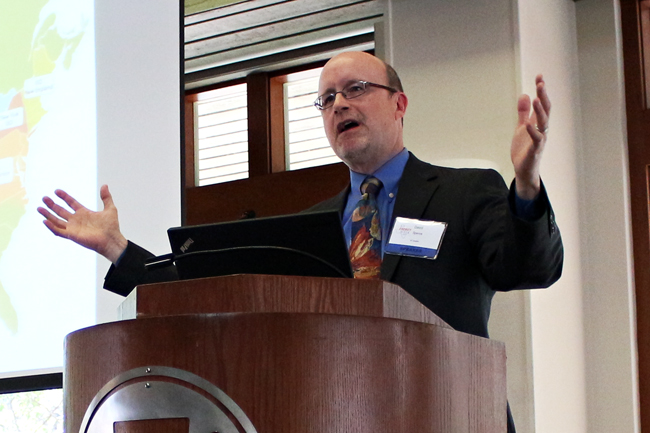Researchers from the University’s Energy Institute are working on a way to decrease the costs and risks associated with using electricity in both homes and public buildings.
Three panelists discussed their research on electricity Thursday at the Etter-Harbin Alumni Center as part of the University’s Energy Week, a conference designed to raise awareness of issues in the energy field.
Gary Rasp, communications director for the Energy Institute, said his research team is working on creating an online calculator to determine the most efficient form of generating electricity.
“The online calculator enables anyone to change the variables for electricity, [and] it not only benefits for consumers, but also policy makers,” Rasp said.
As the team’s research expands, they have to understand both the environmental consequences, such as pollution, and costs associated with electricity use, according to business professor David Spence.
“If you take coal, for example, you can see from the results that in the air there are large pollutants,” Spence said. “As we look at the effects it will have on humans, we will use the differences between morbidity and mortality and try to put a dollar value on the lives that end prematurely being exposed to these pollutants.”
Spence said over the course of the last several decades, the industry has shifted from localized production of electricity within a service area to a broad system in which electricity is produced by third party members located somewhere else. In areas with third-party control, electricity providers have a more robust and active market, but Spence said other parts of the nation, including Texas, have more limited options for electricity use.
“In places like the Northeast and Texas, you have retail competition, so you have retail markets as well,” Spence said. “Those places are places where you have price determining which power is generated and what kind is dispatched to the grid.”
Workers in Texas decide what kind of generators to use to dispatch power to the grid based on the price, according to Spence.
Business professor Jim Dyer said one of the benefits of using a large research team was getting input from experts in different fields.
“In this study, we are fortunate to do it at a university like this with such expertise,” Dyer said. “We are able to use engineers, lawyers, business leaders and members of the LBJ School as we look to bring all the aspects together and break it down to understand the big picture.”


















